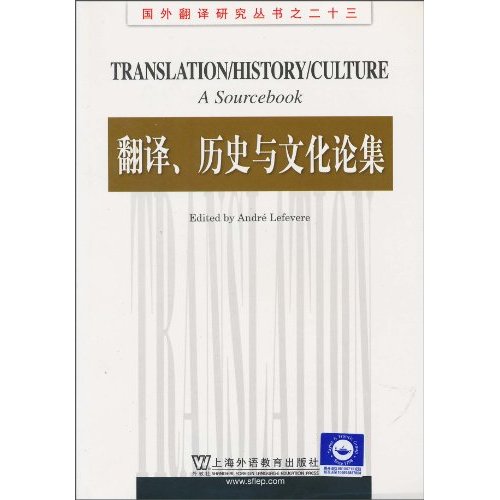
包邮翻译.历史与文化论集

温馨提示:5折以下图书主要为出版社尾货,大部分为全新(有塑封/无塑封),个别图书品相8-9成新、切口有划线标记、光盘等附件不全详细品相说明>>
- ISBN:9787544617772
- 装帧:暂无
- 册数:暂无
- 重量:暂无
- 开本:32开
- 页数:182页
- 出版时间:2010-06-01
- 条形码:9787544617772 ; 978-7-5446-1777-2
本书特色
《翻译、历史与文化论集》:国外翻译研究丛书之23。
目录
节选
《翻译、历史与文化论集》侧重文化视角,收录了从公元前106年到1931年有关翻译研究的重要思想,其中部分文献首次以英文发表,是对翻译研究者知识体系的一个重要补充。书中收录的均是原文中有关翻译论述的片断,分别按意识形态的影响、赞助人的作用,诗歌翻译。文化体系、翻译与语言发展和教育、翻译技巧。中心文本和中心文化等主题排列,是翻译研究领域一本不可多得的参考图书。
相关资料
The original author who is addressing his contemporaries must ofcourse make use of phrases according to their conventional import;he will likewise, for the sake of immediate effect, convey hisgeneral observations in the form of local or even personal allusion.It is the office, we presume, of the Translator to represent theforms of language according to the intention with which they aredeployed; he will therefore in his translation make use of thephrases in his own language to which habit and custom haveassigned a similar conventional import, taking care, however, toavoid those which, from their form or any other circumstances, areconnected with associations exclusively belonging to modernmanners; he will likewise, if he is capable of executing his taskupon a philosophic principle, endeavour to resolve the personal andlocal allusions into the genera, of which the local or personal varietyemployed by the original author is merely the accidental type; andto reproduce them in one of those permanent forms which areconnected with the universal and immutable habits of mankind. TheFaithful Translator will not venture to take liberties of this kind; herenders into English all the conversational phrases according to theirgrammatical and logical form, without any reference to the current usage which has affixed to them an arbitrary sense, and appropriated them to a particular and definite purpose. He retains scrupulously all the local and personal peculiarities, and in the most rapid and transient allusions thinks it his duty to arrest the attention of the reader with a tedious explanatory note. The Spirited TransIator, on the contrary, employs the corresponding modern phrases; but he is apt to imagine that a peculiar liveliness and vivacity may he imparted to his performance by the employment of such phrases as are particularly connected with modern manners; and if at any time he feels more than usually anxious to avoid the appearance of pedantry, he thinks he cannot escape from it in any way more effectually than by adopting the slang and jargon of the day2 The peculiarities of ancient times he endeavours to represent by substituting in their place the peculiarities of his own time and nation.
作者简介
编者:(英国)勒菲弗尔(Andre Lefavere) 合著者:夏平安德烈·勒菲弗尔,翻译研究领域世界一流的学术带头人。著述丰厚,包括《诗歌翻译:七种策略和一个蓝图》(Translating Poetry:Seven Strategies and a Blueprint)、《翻译、改写以及对文学名声的制控》(Translation,Rewriting and the Manipulation of Literary Fame)等。
-

小妇人(纯英文)/床头灯英语.3000词读物
¥8.9¥15.8 -

名著名译英汉对照读本马克.吐温短篇小说选
¥12.0¥28.0 -

英语六级词汇背诵精典 高教版
¥24.3¥89.8 -

英文滑稽诗300首:英汉对照
¥14.3¥42.0 -

你往何处去
¥13.9¥33.0 -

THE GREAT GATSBY-了不起的盖茨比
¥6.0¥16.8 -

浮生六记(汉英对照)
¥18.6¥65.0 -

小王子-法文朗读原版
¥9.2¥20.0 -

爱丽丝漫游奇境
¥3.1¥6.0 -

MADAME BOVARY-包法利夫人
¥12.9¥36.8 -

红与黑-纯英文版
¥9.0¥15.8 -

了不起的盖茨比(纯英文)/床头灯英语.3000词读物
¥5.5¥12.8 -

地心游记(纯英文)/床头灯英语.3000词读物
¥8.6¥15.8 -

包法利夫人(英汉对照)
¥12.8¥29.8 -

三曹诗选英译
¥16.3¥38.0 -

夜莺与玫瑰-全2册
¥13.7¥29.8 -

伊坦弗洛美
¥12.3¥28.0 -

威克菲尔德的牧师-(英语原著版.第三辑)
¥5.2¥12.0 -

新概念英语一课一练 1
¥13.2¥19.0 -

双语名著无障碍阅读名著丛书---纳尼亚传奇
¥19.1¥49.0














